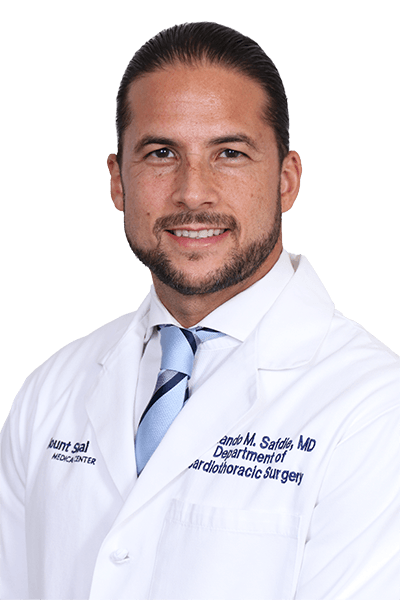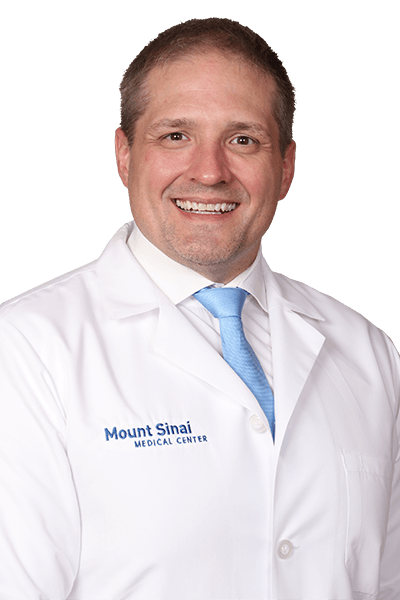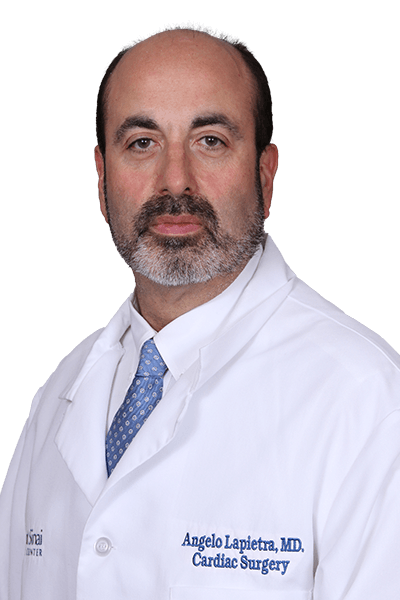Upper GI (Esophageal) Surgeries
Upper GI (Esophageal) Surgeries
Upper GI (Esophageal) Surgeries
Upper GI (Esophageal) Surgeries
Upper GI (Esophageal) Surgeries
Upper GI (Esophageal) Surgeries
Our expert thoracic surgeons use the most groundbreaking technologies and minimally invasive techniques to successfully treat diseases and conditions affecting the esophagus. In fact, the thoracic surgery team made Mount Sinai the first hospital in South Florida to perform a completely robotic esophagostomy — the removal of part of the esophagus and nearby lymph nodes — using a technique that required only two small incisions.
Conditions We Treat
An esophageal diverticulum, also known as Zenker’s diverticulum, is a condition where a pouch forms at the point where your throat meets your esophagus. The pouch forms when the muscle at this juncture tightens and forces the esophagus into a pouch shape above the muscle. At Mount Sinai, our thoracic surgeons can remove the pouch using a minimally invasive procedure where you can go home the next day.
An esophageal stricture occurs when the esophagus is abnormally narrowed so food and liquid cannot pass through. To correct esophageal stricture, your Mount Sinai thoracic surgeon may use a dilation procedure to widen the area of the esophagus that is narrowed. This may be done by a minimally invasive endoscopy.
Barrett’s esophagus is a condition in which precancerous cells are present in the esophagus. It is associated with long-term exposure to gastroesophageal reflux disease (GERD). Treatment for GERD and Barrett’s esophagus includes medical and endoscopic therapies (including radiofrequency ablations), as well as surgical repair by Mount Sinai’s thoracic surgeons. During surgery, your Mount Sinai surgeon will wrap the upper part of the stomach around the lower portion of the esophagus to prevent food and acid from being pushed back into the esophagus. Additionally, she or he may implant a ring of tiny magnets known as a LINX device, so only food passes through, preventing the acid from pushing back up through the esophagus.
This is a condition where you have consistent difficulty swallowing foods and liquids. Some causes of dysphagia include blockages, growths, and other structural abnormalities. These can be treated surgically. Depending on the cause and severity, your Mount Sinai thoracic surgeon will remove any blockages or repair structural issues in the esophagus that may be interfering with your swallowing.
.
This is a rare disorder where the lower esophageal sphincter fails to relax. Most patients with the condition have trouble swallowing, also known as dysphagia. They may have mild chest pain that comes and goes. Retention of saliva and ingested food in the esophagus can cause regurgitation, or the food and saliva can end up in the lungs during breathing (tracheobronchial aspiration). Patients also experience coughing at night and significant weight loss. Achalasia treatment options include endoscopic myotomy (POEM procedure) or minimally invasive robotic-assisted laparoscopic Heller myotomy and Dor fundoplication. During these operations, your Mount Sinai thoracic surgeon will cut the esophageal muscle.
Upper GI (Esophageal) Surgeries
Our Physicians
Roy F Williams, MD
Chief, Divison of Thoracic Surgery
- Cardiology
- Robotic Surgery
- Thoracic & Cardiovascular Surgery
- Lung Cancer
- Mount Sinai Medical Center (Main Campus)
- 305.674.2121
Fernando Safdie, MD
Director of Endoluminal and Airway Surgery
Associate Director of Thoracic Surgery
Division of Cardiothoracic Surgery
- Robotic Surgery
- Thoracic & Cardiovascular Surgery
- Lung Cancer
- Mount Sinai Medical Center (Main Campus)
- 305.674.2121
Steven R DeBeer, MD
Co-Director, Aortic Center
- Cardiac Surgery
- Robotic Surgery
- Thoracic & Cardiovascular Surgery
- Aortic Aneurysm Repair
- Mount Sinai Medical Center (Main Campus)
- 305.674.2121
Angelo La Pietra, MD
Director, Surgical Electrophysiology
- Cardiac Surgery
- Cardiology
- Thoracic & Cardiovascular Surgery
- Robotic Surgery
- Mount Sinai Medical Center (Main Campus)
- 305.674.2121





